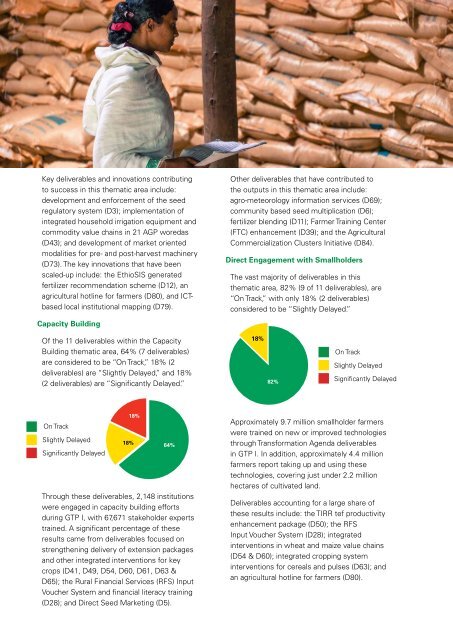PROGRESS REPORT
1LLMfQ4
1LLMfQ4
You also want an ePaper? Increase the reach of your titles
YUMPU automatically turns print PDFs into web optimized ePapers that Google loves.
30 <strong>PROGRESS</strong> <strong>REPORT</strong> GTP I TRANSFORMATION AGENDA 31<br />
Success Factors and Areas for Improvement<br />
Key deliverables and innovations contributing<br />
to success in this thematic area include:<br />
development and enforcement of the seed<br />
regulatory system (D3); implementation of<br />
integrated household irrigation equipment and<br />
commodity value chains in 21 AGP woredas<br />
(D43); and development of market oriented<br />
modalities for pre- and post-harvest machinery<br />
(D73). The key innovations that have been<br />
scaled-up include: the EthioSIS generated<br />
fertilizer recommendation scheme (D12), an<br />
agricultural hotline for farmers (D80), and ICTbased<br />
local institutional mapping (D79).<br />
Capacity Building<br />
Of the 11 deliverables within the Capacity<br />
Building thematic area, 64% (7 deliverables)<br />
are considered to be “On Track,” 18% (2<br />
deliverables) are “Slightly Delayed,” and 18%<br />
(2 deliverables) are “Significantly Delayed.”<br />
Other deliverables that have contributed to<br />
the outputs in this thematic area include:<br />
agro-meteorology information services (D69);<br />
community based seed multiplication (D6);<br />
fertilizer blending (D11); Farmer Training Center<br />
(FTC) enhancement (D39); and the Agricultural<br />
Commercialization Clusters Initiative (D84).<br />
Direct Engagement with Smallholders<br />
The vast majority of deliverables in this<br />
thematic area, 82% (9 of 11 deliverables), are<br />
“On Track,” with only 18% (2 deliverables)<br />
considered to be “Slightly Delayed.”<br />
18%<br />
82%<br />
On Track<br />
Slightly Delayed<br />
Significantly Delayed<br />
The ATA has surveyed deliverable owners and<br />
other stakeholders who have been engaged<br />
in implementing the Transformation Agenda to<br />
identify key factors that have contributed to the<br />
success of deliverables, as well as areas for<br />
improvement going forward.<br />
More than 50% of deliverable owners citetimely<br />
resource mobilization and allocation(56%),<br />
effective stakeholder coordination and<br />
engagement (56%), and clear objectives and<br />
alignment among key stakeholders (50%), as<br />
major contributors to the progress and success of<br />
deliverables. A strong guiding strategy (44%) and<br />
supportive policy environment and government<br />
support (44%) are also frequently cited as<br />
important factors for success. On the other<br />
hand, the most commonly citedareas requiring<br />
improvement are operational implementation<br />
capacity (69%), timely resource mobilization and<br />
allocation (56%), staff retention, commitment<br />
and dedication (50%), and effective reporting,<br />
performance management and M&E (44%).<br />
As the only factor frequently cited both as a<br />
major contributor to deliverable success and an<br />
important area of improvement, timely resource<br />
Contributing Factors of Success & Areas of Improvement<br />
Percentage of frequency of citation by deliverable owners<br />
mobilization and allocation is clearly essential for<br />
Transformation Agenda performance and should<br />
be a key area of focus across all deliverables<br />
going forward. In addition, staff retention and<br />
operational capacity issues, and ensuring early<br />
and ongoing alignment among stakeholders will<br />
also need to be prioritized during GTP II.<br />
Overall, the survey results from stakeholders<br />
involved in the Transformation Agenda confirm<br />
some of the key challenges seen across<br />
Ethiopia’s entire agriculture sector. Namely, there<br />
are strong guiding strategies and policies as well<br />
as a deep engagement by policy makers and<br />
key partners. However, it is the lack of sufficient<br />
implementation capacity, a robust accountability<br />
mechanism and the timely allocation of resources<br />
that often hamper effective implementation of<br />
agreed upon interventions and solutions.<br />
The development of the Transformation<br />
Agenda for GTP II has taken these lessons into<br />
consideration and some specific interventions<br />
have been included in the GTP II Transformation<br />
Agenda to address key issues related to<br />
alignment, accountability and implementation<br />
capacity constraints.<br />
On Track<br />
Slightly Delayed<br />
Significantly Delayed<br />
18%<br />
18%<br />
64%<br />
Through these deliverables, 2,148 institutions<br />
were engaged in capacity building efforts<br />
during GTP I, with 67,671 stakeholder experts<br />
trained. A significant percentage of these<br />
results came from deliverables focused on<br />
strengthening delivery of extension packages<br />
and other integrated interventions for key<br />
crops (D41, D49, D54, D60, D61, D63 &<br />
D65); the Rural Financial Services (RFS) Input<br />
Voucher System and financial literacy training<br />
(D28); and Direct Seed Marketing (D5).<br />
Approximately 9.7 million smallholder farmers<br />
were trained on new or improved technologies<br />
through Transformation Agenda deliverables<br />
in GTP I. In addition, approximately 4.4 million<br />
farmers report taking up and using these<br />
technologies, covering % just under 2.2 million<br />
hectares of cultivated land.<br />
Deliverables accounting for a large share of<br />
these results include: the TIRR tef productivity<br />
enhancement package (D50); the RFS<br />
Input Voucher System (D28); integrated<br />
interventions in wheat and maize value chains<br />
(D54 & D60); integrated cropping system<br />
interventions for cereals and pulses (D63); and<br />
an agricultural hotline for farmers (D80).<br />
Effective stakeholder coordination and engagement 56%<br />
Timely resource mobilization and allocation 56%<br />
Clear objectives and alignment among key stakeholders 50%<br />
Strong guiding strategy 44%<br />
Supportive policy environment and government support 44%<br />
Dedicated leadership and timely guidance 31%<br />
Effective deliverable design and planning 31%<br />
Strong technical advisory and support from partners 13%<br />
Staff retention, commitment and dedication 13%<br />
Success Factors<br />
Evidence-based analysis to support key decisions<br />
Areas of Improvement<br />
Effective reporting, performance management and M&E<br />
Sufficient operational/implementation capacity<br />
6%<br />
6%<br />
6%<br />
6%<br />
6%<br />
6%<br />
0%<br />
0%<br />
13%<br />
19%<br />
25%<br />
44%<br />
50%<br />
56%<br />
69%


